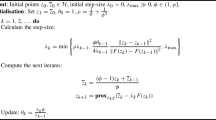Abstract
The article considers the convergence of the Brown-Robinson iterative method to find a mixed-strategy equilibrium in a bimatrix game. The known result on convergence to an equilibrium for a zero-sum game is generalized to a wider class of games that are reducible to zero-sum games by a composition of various transformations: addition of a constant to any column of the first-player payoff matrix; addition of a constant to any row in the second-player payoff matrix; multiplication of the payoff matrix by a positive constant α>0.
Similar content being viewed by others
References
V. Z. Belen'kii, V. A. Volkonskii, S. A. Ivankov, A. B. Pomanskii, and A. D. Shapiro,Iterative Methods in Game Theory and Programming [in Russian], Nauka, Moscow (1974).
A. Vasin,Stability of Mixed Equilibria in Interactions Between Two Populations, Instituto Valenciano de Investigaciones Economicas (1994).
J. S. Jordan, “Tree problems in learning mixed-strategy Nash equilibria,”Games and Economic Behavior,5, 368–386 (1993).
J. S. Jordan, “Bayesian learning in normal form games,”Games Econ. Behavior,3, 60–81 (1991).
J. S. Jordan, “The exponential convergence of Bayesian learning in normal form games,”Games Econ. Behavior,4, 202–217 (1992).
D. Fudenberg and K. Kreps, “Learning equilibria,”Games Econ. Behavior,5, 320–367 (1993).
A. A. Vasin and I. A. Samoilova,Stability of Equilibria in Evolutionary Game Models [in Russian] (1966).
V. A. Il'in and E. G. Pozdnyak,Elements of Mathematical Analysis [in Russian], Nauka, Moscow (1975).
M. Jackson and E. Kalai,Social Learning in Recurring Games, Discussion Paper No. 1138, Dept. Managerial Economics and Decision Sciences, Northwestern Univ. (1995).
M. Benaim and M. W. Hirsch,Learning Processes, Mixed Equilibria and Dynamical Systems Arising from Repeated Games, Preprint, Univ. Calif., Berkeley (1994).
K. Ritzberger,The Theory of Normal Form Games from the Differentiable Point of View, Preprint, Inst. Advanced Studies, Vienna (1992).
J. Robinson, “Iterative method for solving games,” in:Matrix Games [Russian translations], Fizmatgiz, Moscow (1961).
J. M. Danskin, “Iterative method for solving continuous games,” in:Infinite Zero-Sum Games [Russian translations], Fizmatgiz, Moscow (1963).
H. F. Bonenblast and L. S. Shapley, “Games with a continuous convex reward function,” in:Infinite Zero-Sum Games [Russian translations], Fizmatgiz, Moscow (1963).
E. P. Borisova and I. V. Magarik,On Two Modification of Brown's Method for Solving Matrix Games [in Russian], Fizmatgiz, Moscow (1962).
A. Gaunersdorfer, “Fictitious player, Shapley polygons, and the replicator equation,”Games Econ. Behavior,11 279–303 (1995).
Additional information
Translated from Prikladnaya Matematika i Informatika, No. 2, pp. 69–83, 1999.
Rights and permissions
About this article
Cite this article
Bogdanov, A.V. Convergence conditions for the Brown-Robinson iterative method for bimatrix games. Comput Math Model 11, 271–287 (2000). https://doi.org/10.1007/BF02361133
Issue Date:
DOI: https://doi.org/10.1007/BF02361133




